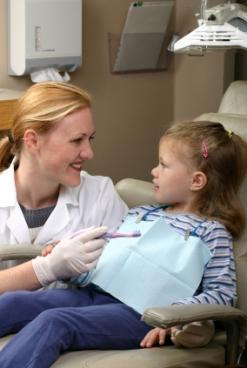
Brushing your child's teeth every day is an essential part of maintaining preschool dental health. Some parents mistakenly believe that because their preschooler's teeth aren't permanent, they don't need to pay particular attention to their dental habits. Nothing could be further from the truth, however!
The Facts
According to the National Institute of Dental and Craniofacial Research, approximately 64 percent of Americans visit the dentist on a yearly basis. What many parents are surprised to learn is that 20 percent of preschoolers experience tooth decay by age five, and 50 percent develop tooth decay by age eight. Your child's health is important to you, and preschool dental health should be just as important!
Preschool Dental Health Problems
Part of your child's development involves his teeth. While good oral hygiene may seem simple, if it isn't done correctly and regularly, dental problems can occur for your preschooler.
Aphthous Stomatitis
Although not that common among preschool age children, aphthous stomatitis can occur. This condition causes small ulcers or canker sores inside the mouth. The exact cause of this condition isn't known, but it has been linked to weakened immune systems, food allergies, poor nutrition, viruses, some medicines, and even stress. Although these sores aren't contagious, they can disappear and reappear for many years. The sores are caused by a virus, so treatment may include the following:
- proper dental care and oral hygiene
- increased consumption of fluids
- medicinal ointments
- mouthwashes
- acetaminophen
- avoidance of salty, spicy, and acidic foods
Pulpitis
The common name for pulpitis is simply toothache. The most common cause of a toothache is a cavity. Symptoms may include the following:
- Painful tooth
- Sore jaw
- Extreme sensitivity
- Fever
Treatment can vary, depending upon your child's age and medical history, but may include the following:
- pain medicine
- antibiotics
- drainage of an abscess
- tooth extraction
- root canal
Tooth Decay
The biggest threat to your child's oral health is tooth decay. The propensity for cavities may somewhat be related to genetics. If you and your spouse were fortunate enough to avoid many cavities, your kids may inherit those good genes. Unfortunately, most children will experience some tooth decay. Because everyone harbors bacteria in his or her mouth, the risk of tooth decay is a very real one. Diet plays a key role in preschool dental health. What you feed your kids has a direct bearing on the condition of their teeth. Bacteria feed on sugars and starches, which can lead to tooth decay.
Preventing Tooth Decay
While all the statistics and evidence can make you want to throw up your hands and say, "I give up!", take heart. There are steps you can take to ensure that your preschooler has good dental health.
- Brush your child's teeth twice a day with fluoride toothpaste. Make this part of your child's daily routine, such as after breakfast and after his bath.
- Brush your child's tongue and gums twice a day as well.
- Once your child turns two, begin flossing his teeth daily.
- Monitor your child's diet and limit sugary and starch-filled foods.
- Take your child to the dentist every six months for a cleaning and exam.
More Information
For more information regarding your child's dental health, check out the following Web sites
- Medline Plus
- Keep Kids Healthy
- Center for Chronic Disease Prevention
- American Dental Association







